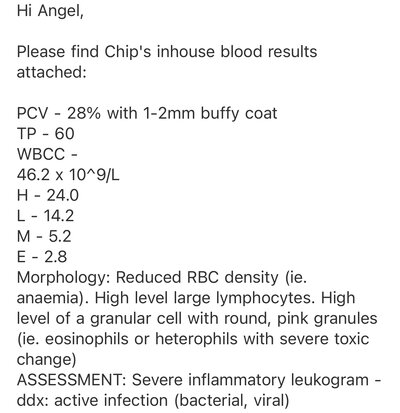- Thread starter
- #11
ChookieChicken
Chirping
- Jul 3, 2020
- 26
- 73
- 84
I just read your article on mareks. heartbreaking but amazingly written and informative. I'm sorry to hear about your experience. I didn't even think to ask the vet for pain relief - I feel so stupid. She must be in so much painThank you @coach723 you explained it perfectly.
My husband treated a lot of it in his practice. It is extremely painful and extremely devastating to vision.
She could have a secondary bacterial infection but that isn't what is causing the eye problem.
You can give your feathered baby a 81mg 'baby' aspirin for discomfort. Of course it isn't going to treat what is happening but it might relieve some of the discomfort. If I have something going on with one of my birds that involves pain from an eye injury I usually give them one a day for a few days to get them through the rough patch.
I had, if memory serves me correctly, 3 or 4 birds with OMD. Their eyes looked a lot like Coach's with the wildly constricted pupil but the iris was the sickly gray green that I mentioned. There looked to be swelling within the eye also making it protrude slightly also.
Survival rate was variable also. The shortest lived one was a rooster who died approximately one year after diagnosis and the longest was a little bantam cross hen who lived to be three. It seemed like the ones who lived the longest succumbed to stroke like neurological symptoms, paralysis on one side, etc, and had to be euthanized. She had very limited vision but believe it or not got along pretty well. She never went outside and I had to make sure there was food and drink where she could find it but other than that she was a sweety until the disease took her.
I understand your pain right now. Anyone who has dealt with the reality of Marek's does. This is painful emotionally but IF you lose a bird or have to euthanize please consider having a necropsy done by a state lab so you get a definitive diagnosis and know where you stand.
My flock started with Buff Orpingtons which unfortunately are highly susceptible to Marek's if that is what you are dealing with. Sweet gentle birds. So live each day with your Chip. You are an excellent Feather Child Parent and are doing all you can for her.

It seems that 100mg is the lowest dose aspirin here - I might cut a tablet in half.
I will definitely get a necropsy done if she passes / has to be euthanized.
This whole thing is so devastating. I had an incredible bond with a chicken named Chookie a few years back. She was taken by cancer as most production breeds are. Chip reminds me so much of Chookie in her ways and personality. It felt so healing to have a special bond with a chicken again after grieving for years. Only for it all to come crashing down in the most horrible way. I can't bear to lose her but in reality I know it's way too possible.





